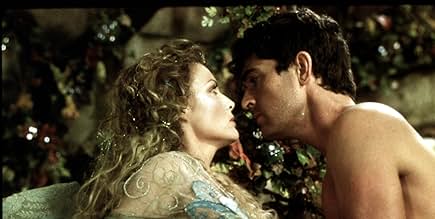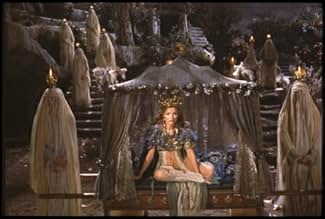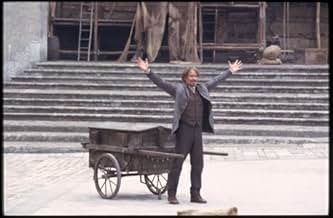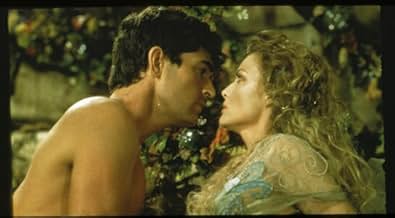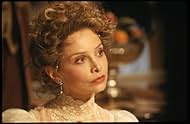PUNTUACIÓN EN IMDb
6,4/10
28 mil
TU PUNTUACIÓN
Las vidas de los amantes se complican por la ley de la ciudad, la realeza de las hadas en disputa y el amor.Las vidas de los amantes se complican por la ley de la ciudad, la realeza de las hadas en disputa y el amor.Las vidas de los amantes se complican por la ley de la ciudad, la realeza de las hadas en disputa y el amor.
- Dirección
- Guión
- Reparto principal
- Premios
- 1 premio y 2 nominaciones en total
Deirdre Harrison
- Hard-eyed Fairy
- (as Deirdre A. Harrison)
Reseñas destacadas
I have seen criticism of this movie saying that the language should have been changed to our post-modern English instead of being the original late-middle/early modern English that Shakespeare used. But those who say that miss the point that what makes these plays so magnificent IS the language that Shakespeare used, and to change it would be to ruin the movie.
Anyways, the acting is marvelous, as it should be from such a cast as this. Michelle Pfeiffer plays the part of Titania with the utmost perfection. Kevin Kline as Nick Bottom is equally as good, and the two end up having a chemistry that is unmistakable (even if he is an ass at this point).
The directing is also great - almost as good as the acting, if not as good. Costumes, sets, everything with exception of there being headlights on the bicycles, is perfect. Michael Hoffman truly pulled of a great feat with this movie, and I would recommend it to anyone.
Also, on a side note, if you have trouble understanding the language, though it be English, watch the DVD and turn on the subtext.
Anyways, the acting is marvelous, as it should be from such a cast as this. Michelle Pfeiffer plays the part of Titania with the utmost perfection. Kevin Kline as Nick Bottom is equally as good, and the two end up having a chemistry that is unmistakable (even if he is an ass at this point).
The directing is also great - almost as good as the acting, if not as good. Costumes, sets, everything with exception of there being headlights on the bicycles, is perfect. Michael Hoffman truly pulled of a great feat with this movie, and I would recommend it to anyone.
Also, on a side note, if you have trouble understanding the language, though it be English, watch the DVD and turn on the subtext.
I'm a professional live theatre stagehand. People who are too centered on movies will have a hard time with this picture. If you could see the original first run performance of this play in Elizabethan England you would think you had stumbled into an over-costumed poetry reading. If the movie is hard to follow try & imagine what viewing that play would be like. It is the measure of Shakespeare's greatness that now 400 years later & in a medium born of photography that this greatest of fantasies still rings true. Try to show some respect; Shakespeare defined modern English. In comparing the lines to the original I thought that the adaptation was sensitive & well thought out. Simplified to fit the film medium but not sacrificing any of the truly great lines that actors drool over. The fairy world sets seemed cramped to me & reminded me of Cocteau's Beauty & the Beast. I personally found the setting of the movie in turn of century Italy kind of fun. Resetting Shakespeare in times & places other than he wrote is pretty much standard practice. The bicycles & the phonographs were amusing to me & generated some fun business for the actors. Kevin Kline was excellent as the ass. He got you to sympathize not pity or deride. In fact the whole amateur troop was memorable. Stanley Tucci was the quintessential Puck. Calista Flockhart threw everything including the kitchen sink into her part. Don't accuse her of overacting though; you'll only give away that you have never been deeply in love. Michelle Pfeiffer was radioactive beautiful, probably fatal closer than ten feet. Rupert Everett maintained perfect believability in a difficult part which is essentially support for Puck. As an answer to anyone who thought that things were a bit oversexed. The Renaissance was all about the rediscovery of the fact that people are noble & beautiful, not sinful & ugly. Shakespeare was one of the greatest products of the Renaissance. The movie is true to those Renaissance ideals. To sum up; a class act & class acts are not for everybody.
Wow... that person who gave it "zero stars out of ****" is a little confused... though not without entertainment value. His comment "Shakespeare would have been apalled" is laughable. why? Because most of his whining was about the plot itself. Does he not realize that Shakespeare WROTE the play A Midsummer Night's Dream, and that that makers of the movie followed the original play TO THE WORD, except for a few dialogue cuts that didn't affect plot? And then he went on to whine about how frivolous and silly the plot is...
you know what? All of Shakespeare's comedy plots are silly and frivolous. That's the point. Remember, in his time, he wasn't an intellectual mastermind... he was an entertainer for the masses. He gave the playgoers what they wanted in his plays, whether comedy, tragedy, or history- and what they wanted was love, mistaken identity, gratuitous violence, a few laughs, and to be entertained. Yes, he was a great playwright. One of the first, in fact, to really give changeability to his characters. Most writers of his time used purely stock characters. Good guys, bad guys, drunk guys, slutty chicks, virtuous chicks, idiots, smart guys... but never 3-dimensional characters. This is what Shakespeare changed. He created 3-D, CHANGEABLE characters.
And don't start on "Oh, you are being shallow". Shakespeare DID put a lot of deeper meanings and metaphore into his plays- but that DID come secondary to entertainment. And even his great plays like Hamlet and Macbeth, with some serious psychological "WTF???" going on, were pretty contrived. I mean, the end of Hamlet involves four dead bodies on the stage, mostly due to mix ups (Hamlet gets stabbed by Laertes' poisoned sword, they keep fighting and manage to switch swords, Laertes gets stabbed with his OWN sword, the queen drinks the poisoned wine meant for Hamlet, then warns him, and he stabs the king AND makes him drink the poisoned wine. Nevermind Ophelia's previous suicide because Hamlet was pretending to be insane, Polonius getting stabbed by Hamlet because Hamlet thought he was the evil king, Rosencrantz and Guildenstern dying in Hamlet's place when they were sent to get him killed, and of course, the death of Hamlet's own father by having poison poured in his ear) So don't start bashing the filmmakers. You said the only good thing they did was the atmosphere... but really, that's all that was left up to them- the presentation. The play was already written, the characters already created, the plot already silly and Chick Flick-y. Sorry. That idiotic "Shakespeare would be apalled" thing just bothers me. I mean, he wrote the fricking thing. So, the only conclusion I can draw from this inane and snooty review is that, like many others, the complexity of the play and its many subplots confused the hell out of you (May I say something about attention spans here??), so you tried to turn it around and blame it on someone else because you're too much of a dolt to figure out what's going on.
Ok, having ranted- I'll make this brief. A Midsummer Night's Dream is like a comedy-chick flick with the added advantage of a cool atmosphere and Shakespeare's poetic dialogue. It's a funny romantic comedic fantasy. If you like that sort of thing, see it. If you don't, then don't. And for God's sake, if you can't understand that dialogue, don't blame it on the filmmakers. There ARE people out there who DO understand it, you know.
you know what? All of Shakespeare's comedy plots are silly and frivolous. That's the point. Remember, in his time, he wasn't an intellectual mastermind... he was an entertainer for the masses. He gave the playgoers what they wanted in his plays, whether comedy, tragedy, or history- and what they wanted was love, mistaken identity, gratuitous violence, a few laughs, and to be entertained. Yes, he was a great playwright. One of the first, in fact, to really give changeability to his characters. Most writers of his time used purely stock characters. Good guys, bad guys, drunk guys, slutty chicks, virtuous chicks, idiots, smart guys... but never 3-dimensional characters. This is what Shakespeare changed. He created 3-D, CHANGEABLE characters.
And don't start on "Oh, you are being shallow". Shakespeare DID put a lot of deeper meanings and metaphore into his plays- but that DID come secondary to entertainment. And even his great plays like Hamlet and Macbeth, with some serious psychological "WTF???" going on, were pretty contrived. I mean, the end of Hamlet involves four dead bodies on the stage, mostly due to mix ups (Hamlet gets stabbed by Laertes' poisoned sword, they keep fighting and manage to switch swords, Laertes gets stabbed with his OWN sword, the queen drinks the poisoned wine meant for Hamlet, then warns him, and he stabs the king AND makes him drink the poisoned wine. Nevermind Ophelia's previous suicide because Hamlet was pretending to be insane, Polonius getting stabbed by Hamlet because Hamlet thought he was the evil king, Rosencrantz and Guildenstern dying in Hamlet's place when they were sent to get him killed, and of course, the death of Hamlet's own father by having poison poured in his ear) So don't start bashing the filmmakers. You said the only good thing they did was the atmosphere... but really, that's all that was left up to them- the presentation. The play was already written, the characters already created, the plot already silly and Chick Flick-y. Sorry. That idiotic "Shakespeare would be apalled" thing just bothers me. I mean, he wrote the fricking thing. So, the only conclusion I can draw from this inane and snooty review is that, like many others, the complexity of the play and its many subplots confused the hell out of you (May I say something about attention spans here??), so you tried to turn it around and blame it on someone else because you're too much of a dolt to figure out what's going on.
Ok, having ranted- I'll make this brief. A Midsummer Night's Dream is like a comedy-chick flick with the added advantage of a cool atmosphere and Shakespeare's poetic dialogue. It's a funny romantic comedic fantasy. If you like that sort of thing, see it. If you don't, then don't. And for God's sake, if you can't understand that dialogue, don't blame it on the filmmakers. There ARE people out there who DO understand it, you know.
A tale of gods and mortals and that most confusing of subjects love. With relationships confused on earth, things become very simple when Puck is given reign to cast love spells on several people to create a complex tangle of love that shows that love never runs straight or true.
I'm that I will be seen as some sort of idiot for not liking this film but, in some vague sort of defence, I'd like to point out that I have seen and enjoyed many other Shakespeare adaptations on the screen and enjoyed many of them. The problem I had with this film was that more time had been spent on the visual presentation rather than the presentation of the story. For this reason I though the film looked really nice and had real imagination and flair behind it but the plot was not given as much work.
I like to think that I am not stupid, but, were it not for the fact that I had a rough knowledge of the story prior to watching this version, I would have really struggled to get a hold of what was going on, as it was I still found it difficult to keep up with. I would have appreciated it more had the film been a little kinder in helping me understand the characters and the plot without relying on me to catch and understand every word (which I couldn't).
I can read Shakespeare and understand the dialogue fine, however when it is coming at me at machine gun pace, I'll struggle and need the visual aspect of the story to help me out a little bit by making the film free to clutter and easy to understand. I'm afraid much of it was lost on me as I struggled to keep up, and the film suffered as a result. Visually of course, it is great and it has it's witty moments but it didn't really do it for me.
Which, considering the great cast, was a shame. Kline stole most of the scenes he was in and was the best part of the film for me, Tucci was an enjoyable Puck, but with many others I found it difficult to find the characters behind the famous faces. Pfeiffer and Everett were both good but I didn't get much from Flockhart, Friel, Bale or West. The cast is deep in faces but this distracted me even more and served to remind me of how much window dressing this film seemed to have when all I really wanted was good story telling.
Overall I didn't enjoy this film simply because I found it hard to get into. I fully intend to watch it again in the future as I feel it may have been partially my fault, but I must say that I did expect a little help from the film. If you look at some recent adaptations of Shakespeare for the cinema you'll see that many have their own touches (visual, not dialogue) and that many of these help to deepen the characters and add understanding for the audience. This film had none of that the fact that it was a film was used to make it look good and bring in a strong famous cast, it should have used the media to also make the story more accessible and fun to watch.
I'm that I will be seen as some sort of idiot for not liking this film but, in some vague sort of defence, I'd like to point out that I have seen and enjoyed many other Shakespeare adaptations on the screen and enjoyed many of them. The problem I had with this film was that more time had been spent on the visual presentation rather than the presentation of the story. For this reason I though the film looked really nice and had real imagination and flair behind it but the plot was not given as much work.
I like to think that I am not stupid, but, were it not for the fact that I had a rough knowledge of the story prior to watching this version, I would have really struggled to get a hold of what was going on, as it was I still found it difficult to keep up with. I would have appreciated it more had the film been a little kinder in helping me understand the characters and the plot without relying on me to catch and understand every word (which I couldn't).
I can read Shakespeare and understand the dialogue fine, however when it is coming at me at machine gun pace, I'll struggle and need the visual aspect of the story to help me out a little bit by making the film free to clutter and easy to understand. I'm afraid much of it was lost on me as I struggled to keep up, and the film suffered as a result. Visually of course, it is great and it has it's witty moments but it didn't really do it for me.
Which, considering the great cast, was a shame. Kline stole most of the scenes he was in and was the best part of the film for me, Tucci was an enjoyable Puck, but with many others I found it difficult to find the characters behind the famous faces. Pfeiffer and Everett were both good but I didn't get much from Flockhart, Friel, Bale or West. The cast is deep in faces but this distracted me even more and served to remind me of how much window dressing this film seemed to have when all I really wanted was good story telling.
Overall I didn't enjoy this film simply because I found it hard to get into. I fully intend to watch it again in the future as I feel it may have been partially my fault, but I must say that I did expect a little help from the film. If you look at some recent adaptations of Shakespeare for the cinema you'll see that many have their own touches (visual, not dialogue) and that many of these help to deepen the characters and add understanding for the audience. This film had none of that the fact that it was a film was used to make it look good and bring in a strong famous cast, it should have used the media to also make the story more accessible and fun to watch.
This is a wonderful film and an excellent version of the classic that was done so very, very well in 1935 and 1968. No, this is not the Royal Shakespeare Company, it's Hollywood but damn good Hollywood. Why? How can canned commercial movie-making compete with the Bard's best? Why does this version make that of the RSC three years before PALE? Well, there's the cast, for one. Stanley Tucci is delightful as a drole erring Puck carrying out the directives of Rupert Everett's pompous Oberon. The delightful Cast of Players, including Rockwell, Irwin, Rees, Wright and (tah-DAH!) Kevin Klein as Bottom. The scenes with the lovelier than lovely Michelle Pfeiffer's Titania are wonderful and poignant. It is delightful to see that gentle erotica can be suggested without nudity or slathering tongues, sucking lips as well as the usual grunts-pants-moans, etc. The lovers are likewise delightful with great, fun-packed performances by Christian Bale's Demetrius and Dominic West's Lysander in complete tune with Anna Fiel's Hermia and Calista Flockhart's Helena. Even David Strathairn's Theseus and Sophie Marceau's Hippolyta are wonderful. The story is moved from Athens Greece to Athens, Italy, at the turn of the 19th century with the lovers escaping on bicycles. Stanley Tucci's confrontation with the bike is a delight. This is a wonderful film with some new twists that depart from but do not detract from the Bard. The bit with Kevin Kline's wife, hard-looking but attractive Heather Parisi, works well with the setting of this fun-filled, joyful presentation.
¿Sabías que...?
- CuriosidadesCalista Flockhart and Anna Friel's mud fight had to be filmed twice. It took four hours to prep and clean the actresses for a second take.
- PifiasThe opening text tells us that the movie is set at "the turn of the 19th century," which would be around 1800. It meant to say "the turn of the 20th century," as the movie is clearly set around 1900.
- Citas
[Last lines]
Puck: If we shadows have offended, / Think but this, and all is mended, / That you have but slumber'd here / While these visions did appear. / And this weak and idle theme, / No more yielding but a dream, / Gentles, do not reprehend: / If you pardon we will mend. / Else the Puck a liar call. / Give me your hands, if we be friends, / And Robin shall restore amends.
- Banda sonoraIncidental music
from the 1843 German stage production of "A Midsummer Night's Dream"
Composed by Felix Mendelssohn
Performed by the Deutsches Symphonie-Orchester Berlin
Conducted by Vladimir Ashkenazy
Courtesy of The Decca Record Company Limited, London
By Arrangement with PolyGram Film & TV Music
Selecciones populares
Inicia sesión para calificar y añadir a tu lista para recibir recomendaciones personalizadas
- How long is A Midsummer Night's Dream?Con tecnología de Alexa
Detalles
- Fecha de lanzamiento
- Países de origen
- Sitios oficiales
- Idiomas
- Títulos en diferentes países
- El sueño de una noche de verano, de William Shakespeare
- Localizaciones del rodaje
- Empresas productoras
- Ver más compañías en los créditos en IMDbPro
Taquilla
- Presupuesto
- 11.000.000 US$ (estimación)
- Recaudación en Estados Unidos y Canadá
- 16.071.990 US$
- Fin de semana de estreno en EE. UU. y Canadá
- 4.285.620 US$
- 16 may 1999
- Recaudación en todo el mundo
- 16.071.990 US$
- Duración1 hora 56 minutos
- Color
- Mezcla de sonido
- Relación de aspecto
- 2.39 : 1
Contribuir a esta página
Sugerir un cambio o añadir el contenido que falta

Principal laguna de datos
By what name was El sueño de una noche de verano (1999) officially released in India in English?
Responde


